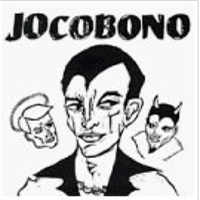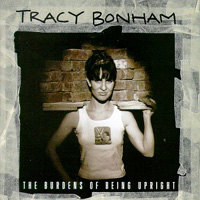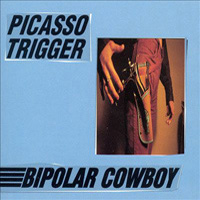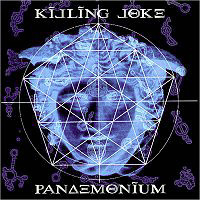 Killing Joke
Killing Joke
Democracy (Zoo)
An interview with vocalist Jaz Coleman and guitarist Geordie
by Joshua Brown
1994 marked the rebirth of the ridiculously influential Killing Joke, whose sound paved the way for countless bands that include Ministry, Nirvana, Nine Inch Nails, Soundgarden, and Metallica (who cover “The Wait” on their Garage Days EP). These latter folks, who have achieved more commercial success than their aural benefactors, readily admit to the indispensible influence of Killing Joke on their music. In fact, the basic riff for Nirvana’s “Come As You Are” was so close to that of KJ’s early MTV hit “Eighties” that they sued (nothing ever came of it, surely in part due to unforeseen circumstances that tabloids have documented ad nauseum). The original Killing Joke lineup, that included vocalist Jaz, guitarist Geordie, bassist Youth, and drummer Paul Ferguson, began in ’79 and disbanded in ’82. Jaz remained the singer of Killing Joke while at the same time cultivating his love for classical composition, working with orchestras from Minsk and Cairo, while in his new home, New Zealand. Geordie remained in the band as well and also recorded in the beginning of the ’90s with Murder Inc., the project of Martin Atkins and Chris Connelly of Pigface/Revolting Cocks fame, Raven (Killing Joke’s second bassist who has gone on to tour with Prong) and Paul Ferguson. Martin Glover, a.k.a. Youth, the man whose re-entry for ’94’s Pandemonium LP was Killing Joke’s rejuvenation, worked as a producer in the twelve years that he was apart from the band. He worked with techno luminaries such as the Orb and the Shamen, and did more traditional production work with the Sugarcubes, the Cult, Tom Jones (who he wrote a couple of songs for), Paul McCartney’s project Fireman, Erasure, and Crowded House. It was in ’92 when Geordie was recording Killing Joke’s Extremities, Dirt and Various Repressed Emotions, and ran into Youth who was upstairs producing Bananarama, that the two decided to get back with the original lineup. The result was Pandemonium, the band’s most vital album since the early days. The next album, Democracy (Zoo) (the eleventh full-length release from Killing Joke), will be released on April 6th.
The new album is not really dance or techno oriented. What direction are you going with this one?
G: Well, it started off like that because we did it on the same trip as the last album. We set up grooves. We put loops up that we agreed on. Then we started putting the music over the top. “Medicine Wheel” started with this “fuck off” sort of Harthouse, Dutch industrial techno. Then when it came to the mix, Youth took it out and we ended up with something quite different. I’d like to do a mix getting it back in.
Are you going to be releasing remixes?
G: Well, it always gets released in England, but that kind of shit isn’t so big over here and you’ve got to really press with the record companies. We’ve got some “fuck off” techno mixes in the singles cause we signed them out to people on the Dragonfly label. Youth did a mix, and Alex at the Orb did a 17 minute version of the single, it’s absolutely wild.
Tell me about your feelings on the coming millennium. The last album dealt with it a lot.
J: I think we’re still on that.
Would you say you’re getting into more specifics on this one?
J: Well, I could be here all fucking day. This album deals more with the alternative lifestyle, as well as the idea of democracy; with finding some of the answers instead of going up some gray cul de sac, like that whole X generation thing. We wrote the album in a very optimistic summer in Cornwall, England. We were exchanging a lot of ideas about how we wanted to live our lives as well as do our music. It’s the most optimistic album that we’ve ever been a part of. The millennium, as you were talking about, is always with us. In New Zealand, we now have proportional representation. We’re moving to a 15 party system, which means that we have a perpetual coalition. We’ll get green and ecological agendas who will be banning the internal combustion engine in the areas where they have influence. People, if they like those ideas, will move to those areas. And so a new form of tribalism will emerge. If the Republican Party has its way in this country, it will give more power to the states, and in twenty years time, instead of having the United States of America, we’ll have lots of different countries. In the end, proportional representation is the only true democratic system. This combines with the ideas we have on the album. Most bands these days like to portray that urban image, “I live in a fucked-up city.” There’s no visionary creativity. Nobody is tackling the future.
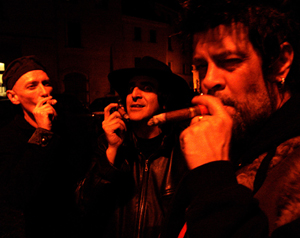 What new music do you enjoy? What’s been coming out recently that you find worthwhile?
What new music do you enjoy? What’s been coming out recently that you find worthwhile?
Jaz: Well, I look at art and music in a different way. I only subject myself to what I perceive as genius. I don’t like mediocrity going to my unconscious mind. I tend to reflect upon some of Dali’s work. I listen to one or two of my favorite great symphonies. Modern trance music, experimental music. I like a lot of music that’s coming out in the German scene. In terms of bands, I’m quite interested in a lot of the bands that are happening in New Zealand, but nothing in the mainstream.
To what extent do you feel your influence has improved the music scene?
G: If new bands had been influenced by U2, we’d be in a fucking sorry state. I’m glad they’re influenced by us.
I read about an old gig of yours when everything went silent for you and you were watching your hands play the notes.
G: Oh yeah, the Reading gig earlier on. It’s wild like that. That’s why we were never heavily into drugs, because we know that if you do the music right, it’s better than any fucking drug there is, man. That’s where the angle of Killing Joke was – the hypnotic side of music. I love a lot of the tones of classical music, but it hasn’t got that hypnotic element which you get with rhythm. That’s still an area to be explored, especially if you look at ancient religious music; it’s based around that and it focuses the community spirit, the tribal spirit.
What was it like recording in the King’s Chamber?
J: It was absolutely incredible. It ranged from hysterical laughter, to feeling the most incredible sense of mystery. The whole thing started with myself and Youth in the Minister of Culture’s office in Cairo. We’d set up this meeting so that we could get into the Pyramids. Youth just pulled out a thousand US dollars and plunked it on the table. He [the Minister of Culture] grabbed it and put it in his top pocket and said, “I’m pleased to say that you now have three days between the hours of so-and-so to have the Great Pyramids to yourselves.” And so, armed with batteries and recording equipment, we set off for the Pyramids. Going into the Pyramids is an incredible experience because you climb up. The sides of them are bigger than you think. It’s bloody enormous. You climb up the side of the Pyramid and you enter this little hole in the wall. And then you go along this narrow passage, and come to this other passage that you have to crouch down in and go up on a 30-degree angle, and just keep going up and up and up. Then you walk up this massive gallery and then when you reach the top, there’s another small entrance, and then you get inside the King’s Chamber. It’s quite big, and echoey. At one end of the King’s Chamber is what looks like a sarcophagus, and that’s where we set up all the microphones. And we ritualized the whole thing. It was like all the years of the band sort of culminating in that moment when we were doing the vocals. You’re looking back on the whole of your life and you’re also looking into the future. And you’re looking back on the past 10,000 years, and feeling the spirits and the presence of the mighty things that have happened in that chamber. It affected me most profoundly.
Did you feel tangible repercussions of that?
J: Absolutely. With any form of ritual, a ball starts rolling. It just changed the way I think about things. The most amazing thing was actually coming out. I’ve got friends that live near the Pyramids. I’ve been going to Egypt since 1981. I studied music there at the conservatory. When we came out of the Pyramid, there were about 50 musicians all playing drums, and people singing, welcoming us when we came out of the recording on the first day. My friend, Abu Setu arranged for all these musicians to meet us when we emerged. It was dusk when we came out. The sun was just setting. It was a cool evening and there was this festival of rhythm outside the Pyramid, and everyone was cheering when Youth, myself, and the recording people came out. It was incredible.
Were there any interesting locations that Democracy was recorded in?
J: Our vision on this album was to keep everything like a band playing live. Strip it down to the fundamentals. The same with our approach in where we wanted to do it. It was English summertime, we were in classic English countryside by the sea in Cornwall. It was a great time to reflect on what we really do believe. At the end of the day, we were forced to acknowledge the fact that we’ve spent the last 17 years going around city to city and we’ve used music as catharsis. We’ve used it to rid ourselves of our more violent tendencies. It got to the stage that we were all well aware that if you’re not part of the answer, then you’re a part of the problem. And so in the end, you’re forced to see how one can beautify one’s existence. You’re forced to become philosophers. Anyone who’s not a philosopher is an asshole. Love of wisdom, in Greek, that’s what it means. There’s a vibe around the band, and around the band’s audience, of awareness. I remember I went to a Faith No More concert, and half the people there were kids who wore the same clothes as the people on stage. There were a lot of clichés, and there wasn’t an awful lot of real content, there wasn’t a level of awareness. It was a level of ignorance. A Killing Joke audience is really quite different, and the atmosphere is different. It makes you think. It’s a different energy altogether.
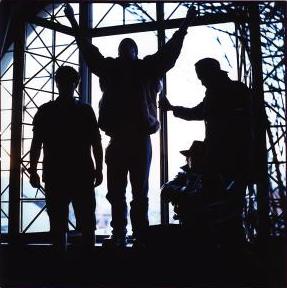 Geordie was quoted as saying that Killing Joke are the “most artistically successful band in the last 20 years.”
Geordie was quoted as saying that Killing Joke are the “most artistically successful band in the last 20 years.”
J: I’d say that’s fair. In terms of contemporary music, we’re getting between three and five bands a week that people say sound like us, or citing us as a reference point. By the end of the century, we will have influenced thousands of bands, and I hope a thousand publishing houses as well.
When you first started the band, did you have any idea what it would turn into?
J: Yes. A clear idea. I remember I wrote it in my diary. I imagined the band before I met the people in the band. It sounded like a generator pumping out cruel images of a primeval world. I wrote in my diary that “it sounded as if the pipes of Pan were fashioned from shiny steel.”
What does the name mean?
J: We’re masters of ambiguity. There are so many different possible meanings. In the beginning, it was representative of a level of despair about the political system, about the music industry, and how it drains all idealism out of idealists, and in the end, they wind up as a homogenized version of what they once were. Killing Joke, in the beginning, represented that feeling of having no control over your own destiny. But then it changed into many different things. It changed into the laughter that overcomes fear. Something that we associated with a long-term victory or campaign. Not short-sightedness.
So, you settled the argument about the mystical “island at the end of the world”? You decided that it was New Zealand?
J: I have. I believe firstly in an agrarian-based economy as opposed to an industrially-based one. I think countries with an agrarian-based economy will survive better in the next century, because industry’s changing all the time. The work force is actually getting smaller, not larger. I believe the land is the answer. Sustainable resources are the answer. I think we’re teaching kids skills which are totally irrelevant to surviving in the world that lies ahead. New Zealand, at the end of the day, will be a model where we can express such ideas as permanent agriculture, a sustainable ecosystem, self-reliance combined with proportional representation in our political system. It’s one part of the world that’s home to Killing Joke, like London is home to Killing Joke.

